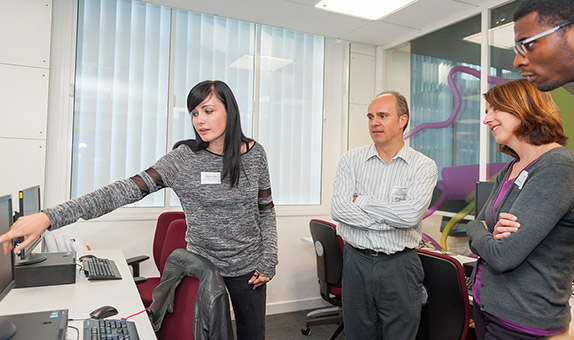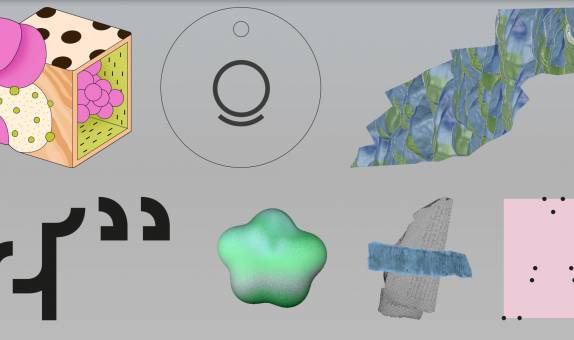User Experience Design MSc
Why choose this course?
The User Experience Design MSc course will equip you with the behavioural theory, design practice and technology know-how that is necessary for a career as interaction designer, usability engineer, user researcher, or head of user experience. The course focuses upon the analysis, design, prototyping and evaluation of multimedia, multi-modal, and multi-platform user interfaces that are easy to use and support a great user experience.
Each taught module will guide you through a UX project – to optimise an interaction, to innovate a digital lifestyle, to apply emerging technology in a persuasive way, and to collaborate on the development of virtual reality. Each project provides opportunities to analyse, design, prototype and evaluate cutting-edge technologies, follow industry trends and apply contemporary theories. A final 'capstone' project completes the student's portfolio.
This course was developed in consultation with our industry panel, which includes Sony Computer Entertainment Europe, DreamWorks and Samsung Design Europe. Kingston University is an active member of TIGA, the British Interactive Media Association (BIMA) and supports the User Experience Professionals' Association (UXPA UK).
| Mode | Duration | Attendance | Start date |
|---|---|---|---|
| Full time | 1 year | Mixed, including block and day/evening sessions; estimated 50 days on site per year |
January 2025 September 2025 |
| Full time | 2 years including professional placement | Mixed, including block and day/evening sessions; estimated 50 days on site per year plus placement year |
January 2025 September 2025 |
| Part time | 2–3 years | Mixed, including block and day/evening sessions; estimated 25 days on site per year |
January 2025 September 2025 |
| Main Location | Penrhyn Road and Kingston School of Art at Knights Park |
Reasons to choose Kingston University
- This course prepares you for a career as a usability engineer, user researcher, user experience designer and general "ux-er".
- You will graduate with an online professional presence and a portfolio that displays your skills.
-
This course was developed in consultation with our industry panel, which includes Sony Computer Entertainment Europe, DreamWorks and Samsung Design Europe.
Why study User Experience Design?
Philosophy and outlook
Online everything
Online services increasingly pervade all aspects of everyday life. User experience is recognised as a key element in the differentiation and success of these services – on the internet, customers must understand and enjoy, or they will go elsewhere.
The trend towards 'online everything, anytime, anywhere, anyhow' seems set to continue. New computing and communications technologies are in the pipeline, online businesses are growing, and digital content is accumulating.
Design for quality and innovation
This trend raises many professional challenges for user experience design, notably:
- how to guarantee that the routine steps of online life can be completed quickly and easily
- how to innovate and create genuinely novel experiences
- how to organise for distributed, collaborative projects, demonstrate the value of user experience design work, and how to operate within integrated, digital media agencies
Digital studio
We created the User Experience Design MSc to meet these challenges. The course provides:
- a project-based curriculum in a 'digital studio' environment
- opportunities for industry-based learning (start-up incubator projects, 'live'/externally hosted projects)
- the opportunity to tailor in-depth studies to suit your background, interests, and practice niche
Digital Media Kingston
To support delivery of the course, we created Digital Media Kingston. This collaboration between the School of Computing and Information Systems and the School of Design provides the multidisciplinary perspective needed to accommodate students with backgrounds in art and design, computer science and the humanities, and to fully address the range of user experience design issues.
Accreditation
The British Computer Society
This programme is currently undergoing re-accreditation following a module enhancement and curriculum redesign process, and so is pending re-accreditation by British Computer Society (BCS), The Chartered Institute for IT.
Accreditation is a mark of assurance that the degree meets the standards set by BCS. An accredited degree entitles you to professional membership of BCS, which is an important part of the criteria for achieving Chartered IT Professional (CITP) status through the Institute. Some employers recruit preferentially from accredited degrees, and an accredited degree is likely to be recognised by other countries that are signatories to international accords. This degree is pending re-accreditation by BCS for the purposes of partially meeting the academic requirement for registration as a Chartered IT Professional.
This degree is pending re-accreditation by BCS, on behalf of the Engineering Council for the purposes of partially meeting the academic requirement for a Chartered Engineer (CEng). Accreditation is a mark of assurance that the degree meets the standards set by the Engineering Council in the UK Standard for Professional Engineering Competence (UK-SPEC). An accredited degree will provide you with some or all of the underpinning knowledge, understanding and skills for eventual registration as an Incorporated (IEng) or Chartered Engineer (CEng).
What you will study
This programme will give you the following opportunities:
- Take the role of a user experience (UX) designer/analyst in an interdisciplinary team of students from across the Digital Media Kingston programme, and use industry-standard techniques to deliver on time.
- Learn about fundamental User Experience activities - analysis, design, prototyping and evaluation - in the context of practical projects. Projects are selected in consultation with students (and mostly individually), so that you can tailor your degree towards the industry sector, technology or job role that suits your interests and ambitions.
- Consider user experience in relation to cutting-edge technologies (big screens, tablets, smartphones, context-aware embedded devices and multi-modal games console), current industry trends (big data, multi-channel services, digital lifestyles), and contemporary theory (cognition 'in the wild', usability vs experience).
- Explore at least one kind of specialist practice in depth, to further distinguish and focus your learning, and practice track record.
- Learn how to present yourself to potential employers through your online professional presence and portfolio.
- Work with industrial hosts, and research-active academics to produce excellent, professional pieces of work that push the boundaries of current understanding and achieve design innovation.
For a student to go on placement they are required to pass every module first time with no reassessments. It is the responsibility of individual students to find a suitable paid placement. Students will be supported by our dedicated placement team in securing this opportunity.
The course comprises four taught modules and a final project.
Year 1
Optional placement year
Final project (June to September)
Core modules
Digital Studio Practice
30 credits
You will work with a multidisciplinary group of students as appropriate for your course (User Experience Design MSc, Game Development (Design) MA, Game Development (Programming) MSc and Computer Animation MA); involved with the digital media production process in response to a project brief developed in consultation with the industry panel and/or research staff. Projects concern contemporary platforms, such as iPhone, Android, Windows, Playstation, Xbox and Next Generation controllers and innovative input devices. You also develop a professional profile (online CV/portfolio) fitting for your role and intended destination which you maintain throughout the course.
- Coursework: report, prototype, and presentation (group and individual)
- Schedule: allow one weekday per week in the first semester
- Staff: course staff
Beyond Optimising Interaction
30 credits
This module is primarily aimed at the User Experience Design field, but also Digital Media Practice, Information Design, Web Development and Software Engineering, as preparation for development of efficient, effective and satisfying user experiences, particularly associated with multi-channel, multi-platform customer-facing services and applications. The module focusses upon engineering approaches to an individual's interaction with computers at work, particularly in the contexts of information seeking, shopping, and co-ordination. The module focusses upon evaluation and prototyping from the perspectives of behavioural science and information technology. It extends diverse background disciplines towards a broad and integrative understanding of as explicit, structured and knowledge-based User Experience Design.
UX for Emerging Technology
30 credits
The module focuses on the research, design, prototyping and testing of UX for emerging technologies, such as Internet of Things, Augmented/Virtual Reality, Artificial Intelligence and CyberSecurity. Specialist techniques covered include conversational design, emotional design, service design, and tools for UX in distributed, collaborative groups.
- Staff: Dr Makayla Lewis
Design Thinking Theory and Practice
30 credits
This module is primarily aimed at the User Experience Design field, but also Digital Media Practice, Information Design, Web Development and Software Engineering, as preparation for development of rich-media, persuasive and engaging user experiences particularly associated with multimodal interaction with personal and ubiquitous computing. The module addresses holistic issues raised by interaction with information in context (the context of small groups, communications, and environments), and focuses upon design and prototyping from as a creative, reflexive practice. Students are encouraged to draw upon diverse sources to inform design decision making processes and methodologies for complex outcomes, including but not limited to approaches from the performing arts, ethnography and service design.
Digital Media Final Project
60 credits
The purpose of this module is to enable students to relate the work of the course to a practical solution and to demonstrate skills in defining, analysing and developing a substantial solution to an individually defined design related problem. It will demonstrate both in content and form the student's advanced understanding of contemporary digital media practice. The research and documentation of the project is an integral part of the submission; reflecting on the process, as well as the critical analysis and methodology of the research itself. The research will be conceptually integrated within the practical work. Individual project topics are expected to be wide ranging and provide the opportunity to fully investigate a practical situation, underpinned by a critical report on the work produced. Topics must allow the opportunity to position work with respect to business, social and cultural goals and identify and apply appropriate technology as a means of delivery. Project topics must demonstrate the potential necessary to achieve the level appropriate to the learning outcomes.
Work placement scheme
Many postgraduate courses at Kingston University allow students to do a 12-month work placement as part of their course. The responsibility for finding the work placement is with the student; we cannot guarantee the work placement, just the opportunity to undertake it. As the work placement is an assessed part of the course, it is covered by a student's Student Route visa.
Find out more about the postgraduate work placement scheme.
Core modules
User Experience Project
60 credits
This module relates the work of the course to a practical solution and demonstrates skills in defining, analysing and developing a substantial solution to an individually defined user experience design-related problem. You will be guided and supported in your choice of project by course tutors and this will be informed by individual career and personal development planning undertaken during the preparation of the proposal.
- Assessment: a portfolio of work, including a thesis (8,000 words), literature review, user research data and prototypes, plus a 'viva' demo presentation
- Schedule: allow approximately fortnightly supervisions for four months (or equivalent)
- Staff: course staff
Work placement scheme
Many postgraduate courses at Kingston University enable students to take the option of a 12-month work placement as part of their course. Although the University supports students in finding a placement and organises events to meet potential employers, the responsibility for finding the work placement is with the student; we cannot guarantee the placement, just the opportunity to undertake it. You may find securing a professional placement difficult as they are highly competitive and challenging, but they are also incredibly rewarding. It is very important to prepare and apply yourself if this is the route you wish to take. Employers look for great written and oral communication skills and an excellent CV/portfolio. As the work placement is an assessed part of the course, it is covered by a student's Student Route visa.
Find out more about the postgraduate work placement scheme.
Entry requirements
Teaching and assessment
Mock-ups, functional prototypes, demos, videos, presentations, design documents, essays.
All taught modules are project-based and assessed by practical coursework. Typically, this involves an in-class presentation for formative feedback mid-way through a teaching-block ('term'), followed by project deliverables at the end of term i.e. as appropriate, project proposals and strategies, personas, user journeys, task models, style guides, low-fi/mid-fi/hi-fi prototypes, and evaluation reports. Project deliverables are typically accompanied by a design report, which relates project processes and decision-making, and/or explains the final design.
In the majority of modules, the coursework topic and project strategy are selected by students, in consultation with module staff and in the light of the student's existing skills, portfolio and intended destination. In the digital studio practice module, students are assigned to a multi-disciplinary groups, and asked to respond to a set creative brief.
What this course offers you
These course features are intended to maintain academic standards and ease the transition from university study to commercial practice, whilst providing an enjoyable and stimulating experience that develops individuals holistically:
- Project-based teaching and learning.
- Talks on principles and methods, and guided practical workshops support the development of UX practice.
- In-class presentations and workshops, and discussions encourage collaboration.
- Coursework topics tailored to development of your portfolio and destination.
- Balanced consideration of research, design, prototyping and evaluation in the context of project management.
- A broad coverage of UX issues that covers mobile, desktop and other devices (Internet of Things).
- User Performance and Experiential Criteria (from utility and efficiency to engagement, persuasion and brand perception).
- Key topics of User Journeys, Design Thinking, Usability Testing.
- Possibility of dovetailing study and work via externally hosted projects, placements and start-ups.
- Whole-day or whole-week delivery eases scheduling for part-timers.
Who teaches this course?
About Digital Media Kingston
The User Experience Design MSc course is delivered by Digital Media Kingston.
Digital Media Kingston (DMK) is an interdisciplinary, collaborative project between the School of Computer Science and Mathematics, and School of Design at Kingston University. Its mission is to bring together creative expression, theoretical analysis, scientific rigour and technological innovation to underpin innovation and excellence in the computational arts.
The teaching element of the DMK project delivers a suite of four related courses: Computer Animation MA, Games Development (Design) MA, User Experience Design MSc, and Games Development (Programming) MSc. You will share the majority of your taught modules with students taking these digital media courses.
Postgraduate students may run or assist in lab sessions and may also contribute to the teaching of seminars under the supervision of the module leader.
Guest tutors and supervisors
User Experience is a practical subject. What counts is not just what you know, but also how you do it. There is great diversity in UX practice, and London is a great incubator for it. At Kingston, we are fortunate to be able to invite a range of researchers, designers, product managers and mentors to lead tutorial groups, and to supervise your coursework projects. Working with experienced practitioners is probably the best way of learning how to practise, and it keeps everyone in touch with real world demands and the professional community.
Fees for this course
Additional costs
Depending on the programme of study, there may be extra costs that are not covered by tuition fees which students will need to consider when planning their studies. Tuition fees cover the cost of your teaching, assessment and operating University facilities such as the library, access to shared IT equipment and other support services. Accommodation and living costs are not included in our fees. Where a course has additional expenses, we make every effort to highlight them. These may include optional field trips, materials (e.g. art, design, engineering), security checks such as DBS, uniforms, specialist clothing or professional memberships.
Facilities – our modern teaching environment
Examples of student work
What our students say
After you graduate
Graduate destinations
Graduates of this course now work in roles such as user experience designer, user experience researcher, product owner, usability consultant, interaction designer, and information architect and content strategist.
Some work in-house, at companies such as John Lewis, Aviva, IBM, E-Bay, BSkyB, RAC, Thomas Cook, BBC) in UK and around the world at Google (USA), Symantec, Microsoft and TPVision (India). Others work for agencies such as Systems Concepts, weare:London, AIA Worldwide, Amaro, Wilson Fletcher and UI Centric, in the UK, and around the world at MediaEngine (Italy), Oxx (Norway) and Thoughtworks (Johannesburg).
Graduates increasingly find employment within UK Government, public sector and charities (Dept Work & Pensions, Ministry of Justice).
You can find out even more (actual employers, career paths, in-demand skills) by asking to join the User Experience course LinkedIn group. The group is open to anyone interested in UX careers.
When does teaching take place?
This course is offered one-year full time, and normally two to three years part time. The full MSc course consists of an induction day, four taught modules, and final project (which is equivalent to two modules).
Three of four taught modules run as one whole day per week during each semester, while the User Experience Design (Systems) module is offered as two one-week blocks, several weeks apart. Normally, each module will include approximately 70 hours contact time, with prior-reading and followed by directed learning. A further approximately 230 hours per module is expected for self-guided study and coursework.
The course is structured to suit all student groups, with block teaching allowing part-time students to study whilst meeting other commitments, and overseas students are also able to complete their degree within visa limitations.
Graduate destinations
Graduates of this course now work in roles such as user experience designer, user experience researcher, product owner, usability consultant, interaction designer, and information architect and content strategist. Some work in-house, at companies such as John Lewis, Aviva, IBM, E-Bay, BSkyB, RAC, Thomas Cook, BBC) in UK and around the world at Google (USA), Symantec, Microsoft and TPVision (India). Others work for agencies such as Systems Concepts, weare:London, AIA Worldwide, Amaro, Wilson Fletcher and UI Centric, in the UK, and around the world at MediaEngine (Italy), Oxx (Norway) and Thoughtworks (Johannesburg). Graduates increasingly find employment within UK Government, public sector and charities (Dept Work & Pensions, Ministry of Justice).
You can find out even more (actual employers, career paths, in-demand skills) by asking to join the User Experience course LinkedIn group. The group is open to anyone interested in UX careers.
Course changes and regulations
The information on this page reflects the currently intended course structure and module details. To improve your student experience and the quality of your degree, we may review and change the material information of this course. Course changes explained.
Programme Specifications for the course are published ahead of each academic year.
Regulations governing this course can be found on our website.










